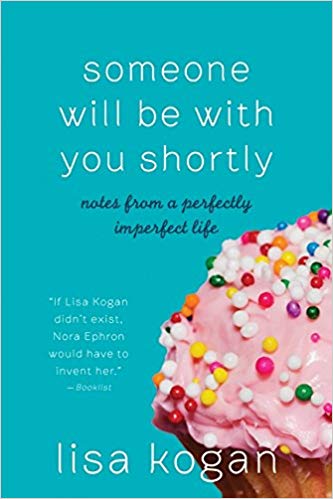There’s no shortage of seriousness in the modern landscape of creative nonfiction. Week after week, The New York Times’ Bestsellers List exalts narratives exploring the horrors of our world: Ta-Nehisi Coates’s Between the World and Me at 84 weeks on the list, Jeannette Walls’s The Glass Castle at 436 weeks on the list, and Bryan Stevenson’s Just Mercy at 119 weeks on the list, to name a few. Just so we’re clear, I’m not trying to criticize the serious side of creative nonfiction. The stories of the aforementioned writers definitely need to be told, and the genre gives them a prime venue to do so. What I’m saying is we’ve got plenty of books exploring the evils of existence, but where are the stories about–well, mundane life? Where are the books that explore everyday problems like forgetting to do the laundry, and celebrate small moments like eating Thai takeout with our family? Even life’s simpler tragedies like Great Clips royally fucking up our hair or our favorite brand of lip gloss being discontinued deserve to be written about, right?
Thank God Lisa Kogan, O, The Oprah Magazine’s resident source of wit, saw fit to address pressing issues like massive insecurity, people who clip their fingernails in elevators, and the temptation of the dessert menu. The result is Someone Will Be With You Shortly, an insightful, sarcastic, and gloriously self-deprecating hot take on life’s smaller struggles.
From her first essay, Kogan introduces herself as a significantly flawed and completely human person. She’s got “one foot planted firmly in the land of the single woman,” a Swiss boyfriend she sees about every two months, and a kid she has zero idea how to raise. She’s just liberal enough to love Rachel Maddow and rail against Guantanamo Bay, but just selfish enough to pity herself when she gets cut in line at Starbucks while buying a Tazo Berry Iced Tea. She’s pretty sure she’s got flabby upper arms, pretty sure it’s because of the junk food she loves to eat, and pretty sure she’s had enough of societal body standards and expectations. And her workday consists of constantly cranking out content, both for an established publication and for freelance work as a ghostwriter, to afford rent for her overpriced two-bedroom apartment in New York City. Or, as she calls it, “the only city that would take me.”
Kogan’s O columns-turned-essay collection of “notes from a perfectly imperfect life” is the fresh batch of witty anecdotes we crave. Stories of bad neighbors, rude butchers, deadbeat men, and disgusting New York subway dwellers feature the deadpan delivery and bizarre specificity of David Sedaris’s journal entries. Throw in the self-aware, self-pitying standup storytelling of John Mulaney, a Lexapro prescription, and a bottle of Sauvignon Blanc, and you’ve got Kogan. She’s quirky, sometimes unbearably awkward, sometimes outwardly mean, but always aware of her place within the world.
Stylistically, she tells each story in a sleek and precise four to seven pages. It’s a result of both her magazine writing background—seven years the Writer-at-Large for ELLE and 19 years at O–and her overworked-mommy lifestyle. Think the humorous, introspective ponderings of David Foster Wallace writing “Ticket to the Fair,” except with a “Barbie backpack-carrying forty-six-pounder with a wobbly front tooth” and without the paragraphs of indulgent description and self-seriousness. The result is perfect for those of us who use our sense of humor to survive life’s incessant busyness.
Despite her length limits, Kogan makes each piece count, just like how she makes each small moment within her pieces count. A sharp attention to detail and a great habit of collecting up eccentricities like Turkish food, her daughter’s stuffed platypus, and a secret stash of $200 in her underwear drawer helps Kogan craft airtight stories about the events and people that matter most. In the world of contemporary nonfiction, she proves you don’t have to speak of the morose, deadly, and horrific in order to get to the heart of the human soul. Instead, she uses the insignificant to magnify the significant. Walking to work or getting snubbed in the apartment lobby become musings on humanity and connection. How many essays exist about a failed third birthday party at a play gym in which one prays “Please, God, let this stuff I just stepped in turn out to be apple juice”? How many function as a larger meditation on what it means to be a good parent? And how many can do it within four pages?

At the heart of each piece is a desire to deconstruct unachievable societal narratives about family and relationships, showing that real love is built on the same thing Kogan builds her writing on: authenticity. For example, she blasts through romantic fantasies, laying bare every petty grievance she’s ever taken with her longtime boyfriend, Johannes. Out of the ashes of these fights that never should’ve happened (like “the would-it-kill-you-to-go-that-extra-step-from-the-sink-to-the-dishwasher episode of last Tuesday”), Kogan reconstructs a beautifully realistic and heartwarming picture of what love is and should be: security, empathy, forgiveness, communication, knowledge of your partner’s favorite sad song singer (Tom Waits), and strong dislikes (animated commercials about toe fungus medications). Kogan says so herself: “Anybody can sprinkle rose petals across a big brass bed, but only a real man will hold your hair while you’re throwing up.”
The same goes with pregnancy and raising a child. Kogan gleefully smashes any ideas of the “happy mommy” archetype by enlightening readers on her twenty-two hour labor, complete with admissions that she may or may not have called her obstetrician a “motherfucking succubus.” She delves into her own relationship with her mother, a delightfully neurotic Jewish matriarch, to whom she may never “say the kind of things you read in Hallmark cards.” But they’ve forgiven each other, with no small effort from their “respective shrinks,” for the many battles of adolescence and for bland dinners of Birds Eye frozen green beans and broiled chicken breasts. And that forgiveness seems more than enough.
As a lifelong resident of the middle class, it sometimes seems Kogan whines about life being unfair a bit too much. But she keeps readers from accusing her of being self-centered, spoiled, or privileged by completely owning her flaws with a stunning amount of self-awareness. Essays like “Bed, Bacon, and Beyond” aren’t written to excuse her fragile ego and short temper, they’re written to expose it. In the vein of darkly comedic essay collections like Sloane Crosley’s I Was Told There’d Be Cake, a book firmly committed to revealing the selfish idiosyncrasies and funny shortcomings of its author, Kogan refuses to show herself as anything less than unabashedly human. The vulnerability of each piece empowers readers to say “Oh my God, me too” when Kogan reveals she operates on “two basic emotions: angst and barely suppressed angst.” Solidarity is found with any reader who finds themselves more upset about breaking their DVD player than the fact the U.S. still doesn’t have universal health care, but Kogan strikes a balance between exploring her own experiences and realizing where they fit within the larger narrative of the world.
However, a few of Kogan’s column-essays do fall short. Some little moments don’t have the strength to stand on their own and prove the profound points she wants to make. For example, in “The First Bad Thing I Ever Did,” a childhood anecdote about Kogan tricking her cousin into petting a vicious monkey at the zoo becomes an allegory for the human ability to cause destruction. The result is a painfully strained attempt at seriousness. Some essays seem rushed and uninventive, too, perhaps a result of her tight magazine deadlines. The essay that’s entirely a list of men she’d consider marrying if her boyfriend tragically passed away, while amusing, reads like a premodern Buzzfeed listicle. Her simplistic formula—just throw humor at life until it starts to make sense!–works perfectly for a 1,000-word weekly column. As a standalone essay collection, though, it gets old, especially when read in one sitting. Yet Kogan manages to keep herself on track to the heart of humanity with a strong sense of self and an insecurity-tinged streak of confidence fighting to exist. And just like she forgives her boyfriend for believing romance is the fancy toilet cleaner that turns the water blue, we forgive her for a few weaker offerings.
Someone Will Be With You Shortly is a brave and honest venture into the absurdity of being alive. It may not hit hard with a story of the human ability to destroy, heal, or hate, but it does hit hard with something we all need a bit of to keep pushing forward: real, unadulterated, imperfect love. It’s this kind of love that makes every life, even ones full of ordinary days, have a bigger impact than we ever give ourselves enough credit to realize. Thankfully, we have Lisa Kogan around to remind us.

